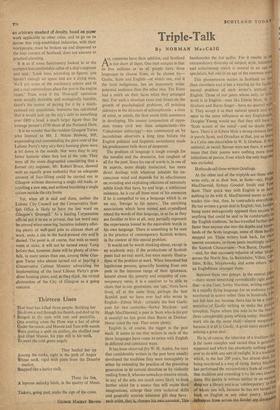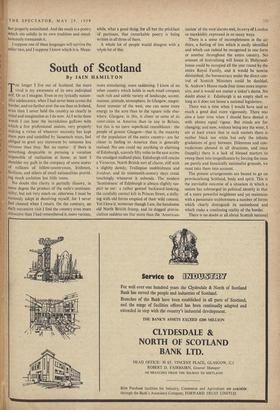Triple-Talk
By NORMAN MacCAIG
AL countries have their oddities, and Scotland is not short of them. One (not unique) is that its five millions or so of people have three languages to choose from, or be chosen by— Gaelic, Scots and English—of which one, and it the least indigenous, has an immensely wider potential audience than the other two. The Fates had a smirk on their faces when they arranged that. For such a situation rains and shines on the growth of psychological problems, all pointing sideways in the direction of schizophrenia : a state of mind, or minds, the Scot needs little assistance in developing. His uneasy conjunction of oppo- sites (more civil war than conjunction)—the 'Caledonian antisyzygy'—was commented on by incredulous observers a long time before the English political and linguistic ascendency made his predicament little short of desperate.
The problem of language is tough enough for the novelist and the dramatist, but toughest of all for the poet. Since his use of words is, in one of its aspects, more deeply instinctual, has more direct dealings with whatever inhabits his un- conscious mind and depends for its effectiveness on revealing and exploiting relations of extremely subtle kinds that have, by and large, a subliminal existence, he is cut off from most of his resources if he is compelled to use a language which is, as we say, 'foreign to his nature.' The enriching associations which have misted and crystallised round the words of that language, in so far as they are familiar to him at all, only partially represent the experiences bound to the equivalent words in his own language. There is something to be seen in the practice of contemporary Scottish writers, in the context of this special problem.
It would not be worth thinking about, except in an academic way, if the productions of Scottish poets had no real merit, but were merely illustra- tions of the problem at work. When interested but lugubrious persons, generally keening from one peak in the immense range of their ignorance, lament about the poverty and insipidity of con- temporary verse, it is a comfort to be able to claim that in our generation, our 'age,' there have lived, all at the same time; perhaps the best Scottish poet we have ever had who wrote in English—Edwin Muir : certainly the best Gaelic poet for two centuries—Sorley Maclean : and Hugh MacDiarmid, a poet in Scots who is (to put it cannily) no less •great than Burns or Dunbar. Never mind the rest. That seems plenty.
English is, of course, the nigger in the peat stack. It seems to me that writers in each of the three languages have come to terms with English in different and consistent ways.
It has been observed (by W. H. Auden, for one) that considerable writers in the past have usually developed the tradition they were inescapably in either by extending the practice of the preceding generation in its natural direction or by violently resiling from it, whereas nowadays creative minds, in any of the arts, are much more likely to hunt farther afield for a source that will excite their imaginations, enlarge their own technical skills and generally nourish whatever gift they have : each artist, that is, chooses his own ancestor. This bamboozles the hoi polloi. For it results in an extraordinary diversity of subject, style, intention and achieVement which is natural in an age of specialists, but odd Ulan age of the common man.
This phenomenon occurs in Scotland no less
than elsewhere and it has a bearing on the funda- mental problem of each Writer's attitude to, English. Those of our poets whose only, or best, work is in English—men like Edwin Muir, Graham and Burns Singer—have no quarrel with it. They accept it as their natural speech and are open to the same influences as any Englishman Douglas Young would say that they still have a 'Scots accent of the mind'—and no doubt they have. There is in Edwin Muir a strong element that is purely Scots, and Orcadian at that, just as there is a Celtic one discernible in W. S. Graham. If this national, or racial, flayour were not there, it would mean that their poems were nothing more than imitations of poems, from which the only begetter was excluded.
Hotheads call these writers Quislings.
At the other end of the triptych arc those who
write only, or at their best, in Scots—say, Hugh MacDiarmid, Sydney Goodsir Smith and Ton' Scott. Their quick way with English is to have nothing to do with it. MacDiarmid seems to con' tradict this—but, then, he contradicts everything. He has written a great deal in English; but, besides being more outrageously opposed than anyone t° anything that could be said to lie comfortably in the 'English tradition,' he has travelled farther and faster than anyone else into the depths and hinter' lands of the Scots language, some of them hardlY mapped yet. These writers look back, for their nearest ancestors, to those poets insultingly called' the Scottish Chaucerians--'Not Burns, Dunbar! —and, for that necessary infusion of other blo0' across the North Sea, to Baudelaire, Villon, CO' bier; Rilke, Mayakovsky and some others. 1.101 an Englishman amongst them.
Between these two groups, in the central el4ce —there seems something symbolically right ahoin that—is the Gad, Sorley Maclean, writing entirelY in a rapidly dying language for an audience to be numbered in scores rather than in .hundreds. I d° not fish him out because there has to be a rePre" sentative of 'Gaelic writing to .make the pictilre complete. Name whom you take to be the two 0! three considerable poets writing today; Macleatt 5 work sits on the same shelf—almost unopene'tl: because it is all in Gaelic. A great many people are missing a great deal.
t He is, of course, the inheritor of a tradition toa
is far more complex and varied than is genera supposed and which has absolutely nothing what' ever to do with any sort of twilight. It is a traditi° which, in the last 200 years, has almost died, Or being murdered is a way of dying. Sorlcy Made° has performed the extraordinary feats of reviving that tradition and extending it by his own innova" tions. His poetry is written neither in an antitlue, shop nor a library and is as 'contemporary' as do.; of whom you will, because he has not turned hl back on English or any other poetry. Modere -..lanuagees from across. the Border are discelatba but properly assimilated. And the result is a poetry Which sits solidly in its own tradition and simul- taneously transcends it.
I suppose one of these languages will survive the other two, and I suppose I know which it is. Mean- while, what a good thing, for all but the prickliest of partisans, that remarkable poetry is being written in all three of them.
A whole lot of people would disagree with a whole lot of this.















































 Previous page
Previous page